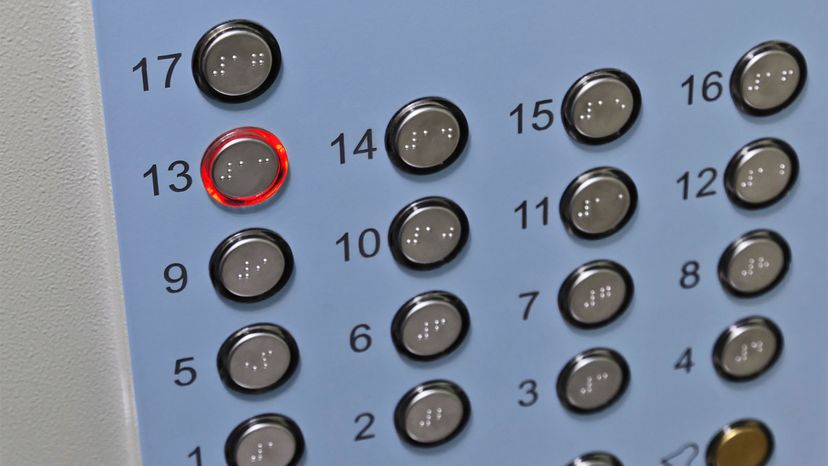Superstitions about lucky and unlucky numbers may seem like they’re little more than tall tales thought up by desperate gamblers, but they impact virtually every stage of life and have moved well beyond the world of gambling.
Whether inspired by biblical stories or the legends of ancient people, these so-called lucky numbers and unlucky numbers have different meanings to many people. Based on little more than a story, where the origin is often unknown, people will alter travel plans, delay purchases or spend their life savings on lottery tickets.
Wonder where these digits earned their reputations? Read on to learn about some of the most popular superstitions in the world of numbers.
13. Number 13
The superstition associated with the number 13 is so common that it even has its very own name, albeit one you probably can’t pronounce: triskaidekaphobia.
People are so afraid of this seemingly innocent number that the United States economy loses almost a billion dollars in business every time Friday the 13th rolls around. It also explains why more than 80 percent of high-rises don’t have a 13th floor: Architects skip straight from 12 to 14 to appease suspicious folks.
So how did 13 get its spooky rep? It might date back to a Norse myth: When a 13th guest showed up to a party attended by 12 gods, one of the gods ended up dead, and tremendous destruction followed. The suspicion of the number 13 could also be blamed on Judas, who was the 13th guest to make it to the Last Supper, and everyone knows how well that turned out.
12. Odds and Evens
When it comes to numbers, some superstitious folks believe that even numbers are unlucky, while being odd lends a number a bit of luck, making it a smart pick for gamblers.
While it’s unclear exactly what the rationale is behind this tale, it could be that even numbers are unlucky simply because they are divisible, which lessens or reduces their power. Odd numbers can’t be reduced in this manner, so they’re stronger and more powerful than even figures [source: Webster].
This superstition even extends to money: Some folks believe it’s best to tear the corner off a two-dollar bill, giving it an odd, three-sided edge, just in case.
11. Lucky 12
Just as 13 is considered one of the unluckiest of all numbers, 12 is the rare lucky number that happens to also be even. The origins of this superstition are sketchy, but some sources suggest that 12 gained its lucky rep simply because it’s so nicely divisible. For such a small number, it can be neatly divided into halves, quarters or thirds. Others believe that 12 wins positive vibes simply because of its close proximity to the supremely unlucky 13.
Of course, there are those who argue that 13 is considered unlucky simply because it’s so indivisible, particularly when placed next to the neatly divided 12. This argument quickly turns into a chicken-or-egg debate, but it doesn’t change the notion that the number 12 comes with an air of luck [source: Patrick and Thompson].
10. Lucky Three
The number three is considered lucky for a number of reasons. First, there’s the fact that a man and a woman — a unit of two — can become a unit of three with the creation of a child, giving the number three a bit of magic all around the world. The figure is also closely associated with the Holy Trinity, which can be found in various forms in many world religions.
In Christianity, there’s the Father, Son and Holy Spirit. Hinduism also has its own Holy Trinity of sorts, Islam has its three main holy sites, and some pagan traditions celebrate the trinity of land, sea and air that make up Earth.
This magic associated with the number three has given rise to sayings like “third time lucky” and “third time’s a charm,” both of which suggest that two failures are sure to be followed by success on the third attempt.
9. Or Not
Of course, three isn’t all sunshine and rainbows. Some associate the number with negative events, such as the superstition that bad things happen in threes. For example, many people believe that things break in groups of three. So if you break something around the house, it’s best to break two more minor things soon after to avoid inadvertently breaking something more expensive down the road.
This idea has been extended to the idea that celebrities die in threes or that lighting three cigarettes with a single match will lead to death.
One explanation for this phenomenon is that perhaps humans have created the rule of three as a way to put an artificial ending on a bad experience; if you know that you’ll only break three things or that only three celebrities will die in a row, you may be able to better control negative events — at least in your mind.
8. Number Nine
The number nine is considered one of the luckiest numbers around the world because it’s three times the magical number of three, which gains its good vibes from its association with the Holy Trinity. That’s why a person having a great day is said to be on cloud nine, while someone who’s looking extra dapper is dressed to the nines.
Even the cat-o’-nine-tails, a painful whip used to punish disobedient sailors, benefited from the power of nine. When used in punishment, many believed that the nine tails of the device would work their magic on the offender, transforming him into a worthy seaman [source: Webster].
Despite the luck generally associated with this number, the Japanese view it with distaste, due to the fact that their word for nine sounds an awful lot like their term for torture or suffering.
7. Counting Superstitions
Forget individual numbers — the very act of counting itself comes with a series of positive and negative superstitions. One folk remedy suggests that counting the number of warts on your body and revealing the number to a stranger will cause the warts to go away.
Of course, you should never count money, your children or your possessions, as this can make them go away as well. The same is true for livestock — like counting chickens before they hatch — as well as fish and gambling winnings. Some superstitious types claim that weighing babies at birth also brings bad luck, as does counting the stones in ancient monuments.
6. Age of Luck
Some numbers are associated with superstitions only when they are viewed as an age. For example, the number 21 has an air of magic because it’s the product of the lucky numbers three and seven. It’s also seen as the start of a new life stage — a time when young people need all the luck they can get.
By the same token, age 63 is seen by some numerologists as unlucky; if you happen to make it past this danger spot and survive to age 64, expect to live a long, lucky life [source: Murrell].
Unlucky ages are so prevalent in Japanese culture that they have a name for them: yakudoshi. For women, these unlucky ages are 19, 33 and 37, while men struggle to make it through the unlucky ages of 25, 42 and 60. [source: Chavez]
5. Beware of 17
Italians treat the number 17 the same way North American cultures treat 13 — for very good reason. The Italians write 17 as XVII, which can be rearranged to form VIXI, which roughly translates to “I’m now dead” or “my life is over.” Not a pleasant thought.
Due to this negative connotation, the Italians bypass the number 17 in many of the same ways Americans skip over the number 13; they avoid using it to number airline seats, flights or the floors in buildings.
Carmakers and other manufacturers avoid using the number when naming products or assigning model numbers, just in case. Ironically, the dreaded 13 is actually considered lucky in Italy, despite its reputation in many other parts of the world.
4. Lucky Number Four
While most even numbers are naturally unlucky because they can be reduced thanks to division, superstition suggests that the number four is actually quite lucky because so many things in nature occur in groups of four — from the cardinal directions and seasons to the elements that make up Earth. And there’s also the ever-lucky four-leaf clover.
Of course, this luck only extends to Western cultures. In China, Vietnam, Korea and Japan, the number four has a decidedly unlucky air — largely because it sounds similar to the words for “death” in these languages when pronounced out loud.
Throughout much of Asia, many people refuse to use the number four in prices, house numbers, phone numbers or buildings due to the superstitions surrounding the figure [source: Murrell]. In some cases, buildings might label the fourth floor as the “F” floor or another alternative to avoid using the number.
In Western culture, the number four is generally treated without specific superstitious significance. While there are a few unlucky fours, like the Four Horsemen symbolizing doom in the Christian Bible, these are exceptions rather than widespread beliefs.
3. Triple Sevens
Lucky number seven! It’s the stuff of legends for gamblers and lottery fans — and the universal symbol for slot machines and big Vegas jackpots. Wondering where the number gained its lucky reputation? It could be attributed to the role that the number seven has played in history, culture and legend.
There are Seven Wonders of the World, seven seas and seven days of the week. God took seven days to create the world, and the ancient world had seven planets. Want some real luck? Seek out the seventh son of a seventh son; he is supposed to have magical abilities, including healing powers and an unending pool of luck.
2. Beware the Devil
Like the number 13, the number 666 has its very own scientific term to describe those who fear the figure: hexakosioihexekontahexaphobia. Thanks to the Book of Revelation, it’s viewed as the number of the beast, or the devil’s number, giving it an unlucky vibe. Many will hesitate if they see this figure as a flight number, hotel room number, a price for a product or even as part of a phone number or street address.
Despite its reputation in the Western world, according to Chinese culture, 666 is about as lucky as it gets. In Chinese, the word for six sounds awfully similar to the word for “smooth” or “flowing,” so three sixes in a row will get the good luck flowing for sure.
1. Lucky Number Eight
Superstitions surrounding the number eight give it luck due to its association with resurrection and renewal [source: Webster]. In Christianity, God created the world in six days and rested on the seventh, leaving the eighth day open for renewal and a better world.
This angel number is also one of just a handful where Eastern and Western superstitions align; the Chinese celebrate the number eight because it sounds like the Cantonese word for “prosperity.”
A car license plate that includes the number eight is seen as lucky, prompting buyers to pay hundreds or thousands more for the plate than one that doesn’t feature the numeral. Some Chinese people even change their address or phone number to include the lucky number [source: Murrell].
Number Superstitions FAQ
What does 666 mean?
What are the unluckiest numbers?
What are the luckiest numbers?
In what countries is the number four unlucky?
Is nine an unlucky number?
Lots More Information
In a world where the majority of people don’t identify themselves as particularly superstitious, it’s astounding just how much impact superstitions about numbers can have on the economy. I was shocked to learn that businesses lose almost a billion dollars each time the 13th of the month just happens to fall on a Friday. While researching this article, I also learned that people in some Asian countries will pay a premium simply for a license plate or street address that contains a lucky number. Manufacturers and retailers have caught on as well, assigning random prices to products that rely more on the inclusion of lucky numbers than on any retail strategy or research.




